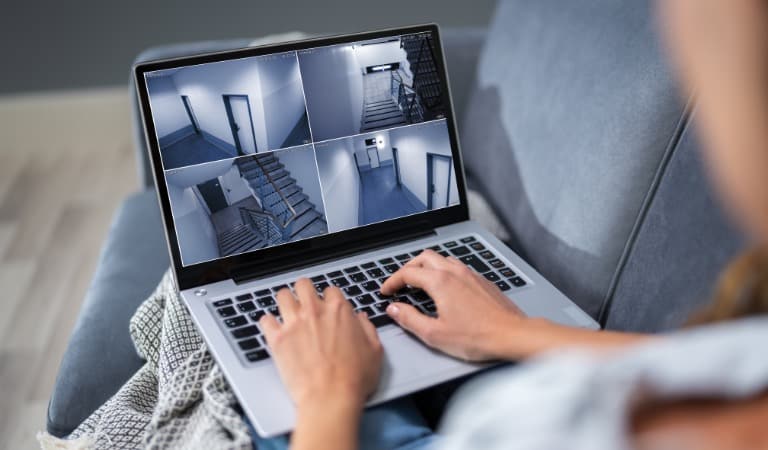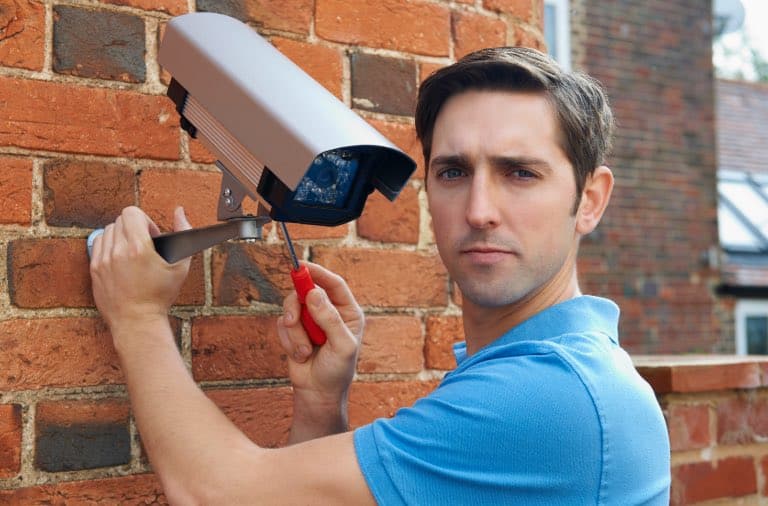You might be here because you’re considering enhancing your home security with a nifty device: a security camera.
But wait, can tenants install security cameras? It’s a valid question, and it’s crucial to get the answer right, especially regarding your safety, your landlord’s property, and the privacy laws that govern them. So, what is the quick answer?
Yes, tenants can install security cameras in their rental properties. However, they should seek their landlord’s permission first, especially if installation requires any alterations to the property. Respecting privacy norms and complying with local laws and regulations is also important.
In this article, we’ll unravel the mysteries of fitting cameras in a rental property.
We’ll explore the do’s and don’ts, the common areas and private spaces, and your right to install a security camera. We’ll also touch on the importance of data protection, the need for permission, and the rules around audio recording.
So, let’s dive in and demystify the world of tenant-installed security cameras.
Contents
Can Tenants Install Security Cameras Legally?
As a tenant, you generally have the right to set up surveillance cameras in your rental property, but there are rules to follow. The main one is causing no damage or changes to the property. Drilling holes or attaching fixtures might need your landlord’s approval.
Remember, these cameras are for your security, not to invade others’ privacy. This includes neighbours or people passing by. Respect your landlord’s property and your fellow tenants’ privacy.
First, check your tenancy agreement. It’s like the rental property’s rulebook, which might mention security systems. If it doesn’t, talk to your landlord.
Your tenancy agreement usually decides if you can install security cameras. Some leases ban modifications, including surveillance gear. So, read your agreement carefully. If it’s not clear, discuss it with your landlord.
Getting written consent is a good idea to avoid misunderstandings or legal issues. Clear communication is key to an excellent landlord-tenant relationship!
Also, camera legality varies by location. Different places have different laws and rules about surveillance and privacy.
In some areas, CCTV cameras in certain places, like shared spaces or gardens, might be restricted. If you share your home with others, like in an HMO, be extra careful. You don’t want to break any privacy laws or regulations.
Before installing cameras, learn about local laws. Consult a legal expert to ensure you’re not breaking any privacy rules. This is important for protecting your rights and keeping a good relationship with your landlord and neighbours.
By understanding your rights, reviewing your tenancy agreement, and knowing the local laws, you can make informed decisions about additional security to your home.
Permission and Consent From Landlord
It’s essential to have a mutual understanding and agreement between tenants and landlords. This understanding ensures that security measures respect personal boundaries and comply with the law.
Let’s break down the important steps to get permission for installation and the ins and outs of consent for exterior surveillance.
Getting Permission for Installation
Before setting up security cameras, tenants must ask their landlords for permission if the tenancy agreement is unclear. This isn’t just a courtesy—it’s a legal must to prevent disputes or violations of the rental agreement.
To get permission, tenants should submit a detailed plan. This plan should cover the types of cameras, their locations, and how they’ll be installed, making sure not to damage the property.
This proposal should emphasise the benefits of having security cameras, like increased safety for tenants and better security for the property. Writing this request is helpful. It creates a formal request that can be referred back to if needed. Landlords usually support security measures as long as they align with property management policies and legal requirements.
Consent for Exterior Surveillance
You need explicit landlord consent if you install security cameras outside your home, like on a building’s exterior or in shared areas. Exterior surveillance can impact neighbours’ privacy and raise legal questions about public spaces.
Landlords must balance the need for security with residents’ privacy rights and expectations. So, consent for exterior surveillance should be clear, specifying where cameras can be placed, how they should be angled, and how footage is stored and accessed.
This consent often involves a detailed discussion about the implications of external surveillance. This includes following local privacy laws and regulations, which might limit where cameras can be installed or require signage warning of surveillance.
Getting permission and consent from a landlord to install security cameras involves clear communication, negotiation, and legal compliance.
By approaching this process thoroughly and respecting privacy and legal boundaries, tenants can enhance their security while maintaining a good relationship with their landlord and fellow residents.
Installation Guidelines for Tenants
Here’s a guide to navigating the installation process, focusing on best practices and the ongoing debate between inside versus outside installations.
Several best practices should be followed to ensure the installation is both effective and respectful of privacy laws and tenancy agreements.
First and foremost, any installation should be done without causing damage to the property. Use non-invasive mounting options like adhesive mounts or clamps that can be easily removed without leaving marks.
Ensure cameras are positioned to monitor your personal entry points and living spaces without extensively encroaching on neighbours’ privacy or capturing public areas.
Tenants must consider the privacy concerns of others and avoid installing cameras in private areas where people expect privacy, such as bedrooms or bathrooms.
All visitors should be aware that surveillance equipment is being used and obtain their consent if the cameras will be monitored or audio will be recorded.
Recording audio is a more sensitive issue than recording video. In many jurisdictions, it’s illegal to record someone without their consent. This is known as wiretapping or eavesdropping laws.
Even if you’re recording in your own home, if the recording captures conversations others would reasonably expect to be private, you could be breaking the law.
Therefore, if you’re considering a security device that records audio, it’s crucial to understand the laws in your area. It’s best to avoid recording audio altogether or seek legal advice if in doubt.
Please ensure your security system meets local privacy laws, especially regarding audio recording, which often has stricter regulations than video surveillance.

Security Camera Maintenance and Data Handling
Setting up security cameras in your rental property isn’t the end of the story. Proper maintenance and responsible data handling are crucial for the system’s effectiveness and compliance with legal and ethical standards.
Let’s explain how tenants can maintain their security cameras and respect data protection laws.
Keeping Footage Secure and Clear
For your security camera footage to be helpful, it must be clear and correctly dated. Regularly check your cameras to ensure they’re working properly, and the view isn’t obstructed. A simple, gentle cleaning of the lenses can keep the images clear. Also, make sure your system’s date and time settings are accurate.
Secure, encrypted solutions are the way to go when it comes to storing footage. They protect your footage from unauthorised access or tampering. If you’re using cloud storage, choose a reputable provider and understand their privacy policies and security measures.
Following Data Protection Laws
In the UK, the GDPR and the Data Protection Act 2018 guide how personal data, including video recordings, should be handled. Here are some key points:
1. Justification: Use security cameras for personal security and property protection, not to monitor individuals without a valid reason.
2. Limited Scope: Limit surveillance to areas directly related to your security concerns. Avoid public spaces or neighbours’ properties.
3. Signage: Inform people they’re being recorded with clear signs.
4. Necessary Access: Only access recorded footage when necessary; don’t store it longer than needed.
5. Right to Access: Individuals captured on camera can request access to footage of themselves and, in certain circumstances, request its deletion.
Remember, maintaining your security cameras and handling data responsibly isn’t just about technical upkeep. It’s about ethical and legal stewardship.
By ensuring the integrity of recorded footage and complying with data protection laws, you’re creating a secure yet respectful living environment.
Resolving Disputes Over Security Cameras
Disagreements about security cameras often boil down to privacy, camera placement, and surveillance coverage. Here’s how tenants can handle these disputes effectively.
Steps to Take When Disputes Emerge
When disputes arise about security cameras, start by revisiting installation agreements or policies. This includes reviewing your tenancy agreement, property management policies, and local surveillance and privacy laws.
If the dispute continues, document all communications and resolution attempts. This documentation can be very useful if legal or mediated resolution becomes necessary.
Having a conversation with the other party is vital. Try to understand their concerns fully and explain your reasons for installing the cameras, highlighting the privacy measures and legal compliance you’ve maintained.
In some cases, a third-party mediator might be helpful. Many communities offer dispute resolution services that can be less adversarial and more cost-effective than court.
The Power of Communication and Compromise
Good communication is key to resolving disputes peacefully. Approach conversations with empathy, acknowledging their concerns while stating your perspective and the steps you’ve taken to respect privacy.
Open dialogue often clears up misunderstandings and paves the way for compromise. This might mean adjusting camera positions for less intrusion or agreeing on usage limitations.
For example, you could agree not to record audio or ensure cameras only cover your personal space, not common areas or neighbours’ properties.
Remember, the goal is to win and create a respectful living environment. By being adaptable and cooperative, you can often find solutions that meet everyone’s security and privacy needs.
Dispute resolution doesn’t have to be a battle. With proactive communication, compromise, and respect, tenants can navigate these situations and maintain positive relationships.
Alternative Security Measures for Tenants
While fitting security cameras might be a grey area for tenants, there are plenty of other security measures you can take that are tenant-friendly. One such option is the Ring Video Doorbell.
The Ring Video Doorbell is popular because it’s less invasive than traditional security cameras. It’s a doorbell with a built-in camera that lets you see and speak with visitors from your smartphone, even when you’re not home. It’s a great way to enhance your home’s security without stepping on any privacy toes.
Consider a few things before fitting a Ring Video Doorbell or similar device. First, check your lease agreement to ensure it doesn’t prohibit the installation of such devices. You’re usually good to go if it’s silent on the issue.
However, informing your landlord about your plans is always a good idea. Clear communication can help avoid any potential misunderstandings or problems down the line.
Other alternatives include upgrading locks, using motion-sensor lights and ensuring visibility around the property.
Summary
When it comes to home security, it’s like choosing a pizza topping – we all have our unique preferences. Some of us might be minimalists, satisfied with just a lock on the door, while others might want a full-blown, high-tech system that would make James Bond green with envy.
The key is to find a balance that suits your lifestyle and budget. For instance, if you live in a ground-floor apartment, you might consider investing in window locks or a security camera. If you’re a frequent traveller, a smart home system that allows you to control your lights and locks remotely could be a lifesaver.
And finally, don’t forget to involve your landlord in the conversation. They might have specific rules about what you can and can’t install. But don’t worry, with a bit of negotiation and charm, you can probably convince them to let you install that state-of-the-art security system you’ve had your eye on.
After all, your home should be a safe and secure space to relax and unwind.

